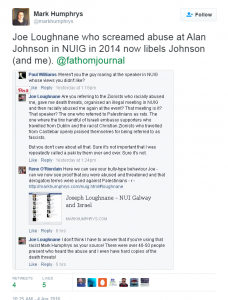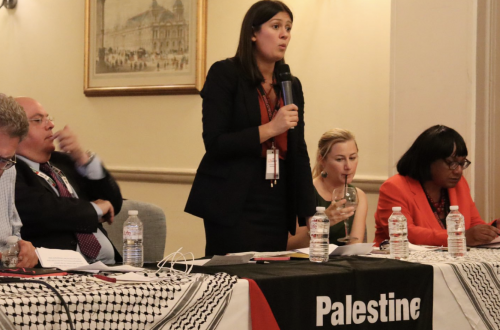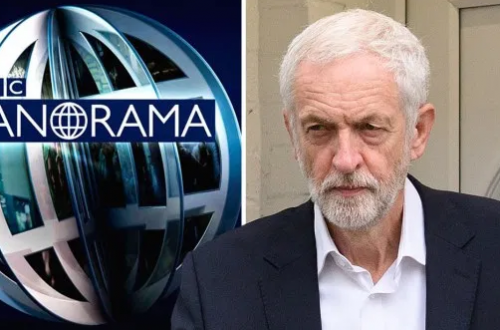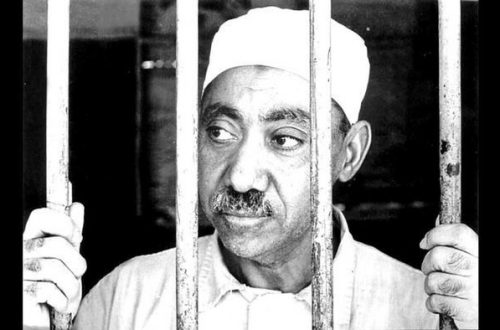Guest post by Alan Johnson
Some people will remember the warm reception I was given at the University of Galway in March 2014 by a very strange man called Joseph Loughnane when I spoke against BDS. (WATCH very funny 40 second video.) I had hoped never to think about the strange man again, but he is now telling people on Twitter that I called Palestinians “rats”. See here.
So I thought I’d upload the speech I actually delivered that night, in which I spoke for two-states for two peoples, as a ‘friend of Israel’ and a ‘friend of Palestine’. For the record, and because the speech might help others make the argument against BDS, especially to the left that has lost its way, here is the text of the speech.
Solidarity not Boycotts: the progressive case against boycotting Israel
Alan Johnson
University of Galway, 5 March 2014
Introduction
Thank you for inviting me to Galway University.
I am the editor of Fathom journal, and Senior Research Fellow at BICOM. I speak as a friend of Israel, a friend of Palestine and friend of peace. I am not Jewish. I am a democratic socialist, an editor of Dissent magazine and a former editor of Historical Materialism. I am a Professor of Politics – my inaugural lecture was on the thought of the Auschwitz survivor, Primo Levi.
I am a Zionist: that means that I believe in Israel as the embodiment of the right of the Jewish people to self determination. I believe in full civic equality for Israel’s minorities. I am a two state-er and have been for 30 years. I believe in the right of the Palestinian people to national self-determination: two states for two peoples.
Part 1: The impulse to ‘do something’ is a good one
Some people say that all boycott proposals are anti-Semitic. I’m not one of them. So let’s put that aside. I believe most people who support boycotts sympathise with the Palestinians, want the Palestinians to have a state, and want to ‘do something’ to further that cause.
My argument? Boycotts are the wrong something.
Boycotts, however well-intentioned, are unjust and counter-productive.
Boycotts push a Palestinian state further away.
I will make the case for seeing boycotts as the wrong something – I will offer six good reasons for voting ‘no’ tomorrow in the referendum on supporting BDS.
Finally, having said the impulse to ‘do something’ is often a good one, I will make clear I am not here to tell you to do nothing. I want to persuade you that there are better ‘somethings’ to do – practical things, constructive things; things that will bring a Palestinian state closer. I’ll talk about them too.
Part 2: Why boycotts are the wrong ‘something’ to do
The first and second reasons that boycotts are the wrong ‘something’ to do: boycotts strengthen the hardliners in Israel and weaken the peace camp in Israel.
1: Boycotts create a siege mentality and strengthen the hardliners in Israel.
Boycotts only strengthen ‘fortress’ attitudes inside Israel.
Boycotts strengthen that part of the Israeli right that does not want a Palestinian state.
Boycotts can seem to prove the argument of the Israeli hard right: ‘We are friendless. The international community and global civil society does not understand the security threats we face, or the peace offers we have made. So we should not take risks for peace. Let’s hunker down instead.’
Boycotts create a siege mentality within Israel. It should be obvious why that is the case. As Uri Avnery – the veteran Israeli leftist – reminds us, ‘Centuries of pogroms have imprinted on the consciousness of the Jews the conviction that the whole world is out to get them. This belief was reinforced a hundredfold by the Holocaust. Every Jewish Israeli child learns in school that “the entire world was silent” when the six million were murdered.’ Avnery goes on: The Holocaust will have a decisive impact on any call for a boycott of Israel. Whatever you intend by the boycott, it will remind many people around the world of the Nazi slogan “Kauft nicht bei Juden!” – don’t buy from Jews.
So a boycott of Israel would not produce what you think and want it to produce. That’s reason number one to vote no tomorrow.
2: Boycotts are an abandonment of the Israeli left, the Israeli peace movement, the Israeli trade unions, Israeli civil society and the rock-solid two-thirds of Israeli Jews who support the two state solution: two states for two peoples.
These are, or should be, your natural allies. Vote ‘yes’ tomorrow and you are turning away from them.
Take the proposal to boycott Israeli universities. It’s madness! Israeli universities continue to be centres of dissent and drivers of coexistence. And yet you propose to boycott them.
Most Israeli academics are liberals; they oppose settlements, support the two state solution, and need your solidarity. And yet you propose to boycott them.
It was Israeli academics, working with Norwegian academics and Palestinians, who initiated the process that led to the Oslo Peace Accords of 1993. Did you know that? If the boycott had been in place that could not have happened.
And it is only Israelis academics you propose to boycott. Why only Israel? China has occupied Tibet for 5 decades. It has no free press or party system or elections. It still has a Gulag –a labour camp system. But you call for no boycott of China. Why?
“Because Israeli universities are ‘complicit’ with the Occupation”, the boycotters will say. But that is nonsense. They are no more ‘complicit’ in the Occupation than British or American academics were ‘complicit’ in the invasions of Afghanistan and Iraq.
So, boycotts will strengthen the hard liners and weaken the peace camp within Israel.
3: Boycotts weaken the Palestinian supporters of the two state solution and embolden the Palestinian extremists such as Hamas who reject Israel’s very existence.
The PLO does not support a boycott of Israel. The Palestinian Authority does not support a boycott of Israel. The leader of the PLO and the PA, President Mahmoud Abbas, does not support a boycott of Israel.
Abbas said recently: ‘No, we do not support the boycott of Israel. We don’t ask anyone to boycott Israel itself. We have relations with Israel, we have mutual recognition of Israel.’ (Abbas does support a more limited boycott, of settlement products: but that is not the choice you face in your referendum tomorrow, which calls for a total boycott of Israel.)
The boycott movement emboldens those fundamentalist leaders in Hamas that threaten the basic freedoms of Palestinians from within and the existence of Israel from without.
Some of the pro-boycotters say “Hamas is just like the African National Congress, Nelson Mandela’s organisation.” They say “Mandela was called a ‘terrorist’ too.” They say “They are really Freedom Fighters!”
Really? Have you ever compared the ANC’s Freedom Charter to the Hamas Charter?
The African National Congress Freedom Charter proclaims that ‘South Africa belongs to all who live in it, black and white … The rights of the people shall be the same, regardless of race, colour or sex.
The Hamas Charter takes a different tone. ‘Israel will exist and will continue to exist until Islam will obliterate it, just as it obliterated others before it. (…) [Hamas] aspires to the realisation of Allah’s promise, no matter how long that should take. The Prophet, Allah bless him and grant him salvation, has said: ‘The Day of Judgement will not come about until Muslims fight the Jews (killing the Jews), when the Jew will hide behind stones and trees. The stones and trees will say O Muslims, O Abdulla, there is a Jew behind me, come and kill him.’
Nelson Mandela’s approach to the Israeli-Palestinian conflict was pretty much the opposite of the Hamas approach.?
Here is Mandela: “As a movement we recognise the legitimacy of Palestinian nationalism just as we recognise the legitimacy of Zionism as a Jewish nationalism. We insist on the right of the state of Israel to exist within secure borders, but with equal vigour support the Palestinian right to national self-determination. We are gratified to see that new possibilities of resolving the issue through negotiation have arisen since the election of a new government in Israel. We would wish to encourage that process, and if we have the opportunity, to assist.”
And here is Hamas: “There is no solution for the Palestinian question except through Jihad. Initiatives, proposals and international conferences are all a waste of time and vain endeavours.”
And there is no consensus among Palestinians about the tactic of boycotts, by the way. It is a western orientalist fiction to think all Palestinians think the same thing!
For example, the president of Al Quds University, in east Jerusalem, Sari Nusseibeh, speaks clearly and eloquently against the campaign to boycott his Jewish colleagues on the other side of his city. Nusseibeh asks for academics to come to Al Quds to teach, to help, to show solidarity.
For example, the Palestinian intellectual and academic Edward Said said “I believe it is our duty as Palestinian and yes, even Arab intellectuals to engage Israeli academic and intellectual audiences by lecturing at Israeli centres, openly, courageously, uncompromisingly. What have years of refusing to deal with Israel done for us? Nothing at all, except to weaken us and weaken our perception of our opponent” (Al-Ahram weekly 378, 21-27 May 1998).
4. The intellectual foundation of the boycott campaign is the false Apartheid analogy.
You don’t boycott an entire county because its minorities are not fully equal, or because they still suffer some discrimination and racism. No, you boycott an entire country when it is unique evil, outside the community of nations, a kind of crime itself. Only the Apartheid analogy – the claim that Israel is just like Apartheid era South Africa – can justify a boycott. And that why the BDS movement seeks to ‘South Africanise’ the discourse about Israel (‘Zionism is racism’ ‘The PA is a Bantustan’ ‘The Apartheid Wall’, ‘Israel is Apartheid state’ and so on).
But the apartheid analogy is false. It is a smear.
FILL IN FROM EXEC SUMMARY OF APARTHEID SMEAR
Boycotts invite you to think of the conflict as right versus wrong. But as Amos Oz, the Israeli novelist and a founder of Peace Now puts it in his wonderful little book How to Cure a Fanatic, the conflict between the Israelis and the Palestinians is not a case of right versus wrong, but right versus right. It is a complicated, long-running and hitherto intractable conflict between two peoples, about their equally legitimate national claims over a piece of land. The two parties – Israelis and Palestinians – have worked with the international community to negotiate a resolution to the conflict. They have come close to a deal in recent times at Camp David in 2000, Taba in 2001 and Annapolis in 2007-8. In 2014 they are trying again, with US, European and Arab League backing. The Apartheid Smear just gets in the way of both a proper understanding of the conflict and it gets in the way of you, as global civil society activists in the west, making the contribution you could to peace-making efforts.
5. Boycotts recruit people not just to a tactic, but to a political programme – a reactionary, anti-democratic and politically useless programme: the one state solution.
My guess is that most people in this room, the vast majority, support the two state solution to the Israeli-Palestinian conflict. Though your sympathies may lean one way or the other, deep down you know that a solution to the conflict involves the agreed division of the land and the recognition of the right to national self-determination to two peoples.
Even if boycotts became widespread, they would not create a Palestinian state. Do you know why? Because you fundamentally misread why there isn’t a Palestinian state now. It isn’t because Israel does not want to get out of the West Bank. It does. The public, the politicians, the army, the Shin Bet (did you see The Gatekeepers?) the Mossad – more or less the entire bloody elite wants to divide the land.
But Israel will not commit national suicide. It won’t just walk out of the West Bank with no security guarantees and no peace agreement. To secure that agreement the parties need mutual recognition and political compromise. That means building trust and engineering engagement. The polarisation produced by boycott activism and talk of the ‘one state solution’ points in the opposite direction.
6. There is a sixth reason that boycotts are the wrong something to do when you want to ‘do something’
Remember I said the motivation of very few boycotters was anti-Semitic. I believe that. But you are all students, clever people who know that the phenomenon of racism is not exhausted by the matter of the presence or absence of personal, conscious motivation. And it is a matter of fact – just brute fact – that boycotts of Israel have always, whatever their intentions, been a lightning rod for anti-Semitism.
Why?
Well, to justify discrimination against certain academics by virtue of their nationality there is a tangible risk of slipping from political criteria to the vilification of a whole people. If you launch a campaign to exclude Israeli Jews, but nobody else, from the global academic, cultural, sporting and economic community, then it’s kind of inevitable that your campaign will act as a lightning rod for antisemitism.
The website Engage has a catalogue of this.
From pickets outside Marks and Spencer to UCU Mona Baker throwing Israelis off editorial boards just for being Israelis.
From the chief spokesperson for BDS in South Africa being found guilty of hate speech against Jews by the SA Human Rights Commission, to the UCU official who claimed that money stolen from Lehman Bros was paying for anti-boycott lawyers.
Look, there is a lot of ‘radical’ antisemitism around. A porous border between being radical and transgressive and being antisemitic. Think of the quenelle phenomenon.
Part 3: There is a better something to do
The Apartheid Smear and the linked BDS campaign consume energies that should be invested in a different kind of activism; pro-Palestinian and pro-Israeli: pro-peace.
We should support all efforts on both sides towards mutual recognition, engagement, acknowledgement of each other’s narratives, compromise and the peace of a final status agreement that secures two states for two peoples.
We should meet Nelson Mandela’s challenge to support those on both sides of the conflict who seek mutual recognition and peace.
Many organisations do just that, and you can make links with them and invite them to campus, visit them, support them.
One Voice Movement – amplifies the voices of the mainstream Israelis and Palestinians who desire peace and to empowers them to generate change. They run town hall meetings, have chapters in university classes and provide leadership training for their activists. One Voice provides crucial support to the ‘Caucus for Ending the Israeli-Arab Conflict in the Israeli Knesset.’
Parents Circle – Families Forum (PCFF) comprises roughly 600 inspirational Israeli and Palestinian families who have tragically lost a family member as a direct result of the conflict. One example of the Parents’ Circle’s work is the ‘Dialogue Meetings’ which reach more than 25,000 Israeli and Palestinian students annually. One student said ‘I never had a dialogue or met a Palestinian in the past. It was an eye opening experience which gave me a different perspective. I discovered things which I never believed happen on the other side and also their willingness to reconcile. This gave me so much hope and caused me to look at things differently.’
MEET, is an exceptional educational initiative that develops and enhances professional skills amongst Israelis and Palestinians. Through a partnership with the Massachusetts Institute of Technology (MIT), MEET provides its participants with advanced technological and leadership competencies while simultaneously instilling the ability for these young leaders to create social change within their own communities. MEET tackles misconceptions Israelis and Palestinians have towards one another and through cooperation and joint educational classes, ensures mutual respect within the class.
The Peres Centre for Peace. a non-governmental, non-political organisation that brings Israelis and Palestinians together from many spheres. Their projects include the highly successful ‘saving children’ programme that takes Palestinian children into Israeli hospitals for complex procedures and diagnosis where such services are unavailable in the Palestinian Authority. They also have a project called ‘training doctors’ that aims to enhance the Palestinian healthcare system by providing advanced training opportunities for Palestinian doctors in Israeli hospitals.
You could support NGOs that campaign for civil rights in Israel and the Territories, such as ACRI.
You could support the Histadrut which in 2008 signed an agreement with the PGFTU, the Palestinian trade union federation, to the cheers of the TUC, the ITUC and the Global Federations. But that agreement was met with opposition in the BDS movement. Think about that.
You could support organisations that struggle for equality for Israel’s Arab citizens – Tsofen, Sukkuy, Injaz, and others.
You could reach out directly and support Palestinian universities.
John Strawson is an academic, a specialist in the Middle East and Islam and a Reader in Law at University of east London where he is Co-Director, Centre on Human Rights in Conflict. Every year, for many years, John has spent part of the year teaching in Bir Zeit University. You could do that. John opposes the occupation and he opposes the boycott. You can do both, you know.
John says the better ‘something’ to do is to be in practical solidarity with Palestinian universities. Build Palestine up don’t pull Israel down. Make institutional links, develop teaching and research activities in partnership, enable academic and student exchanges, mobilise educational resources, develop and maintain academic contacts.
Boycotts – as well as undermining academic freedom –consumes energies that could be spent on that practical solidarity.
Getting involved with these constructive ‘pro-Israel, pro-Palestine, pro-Peace’ organisations is the real alternative to the dead-end and destructive politics of ‘BDS’ and the Apartheid Smear.
Ending …



